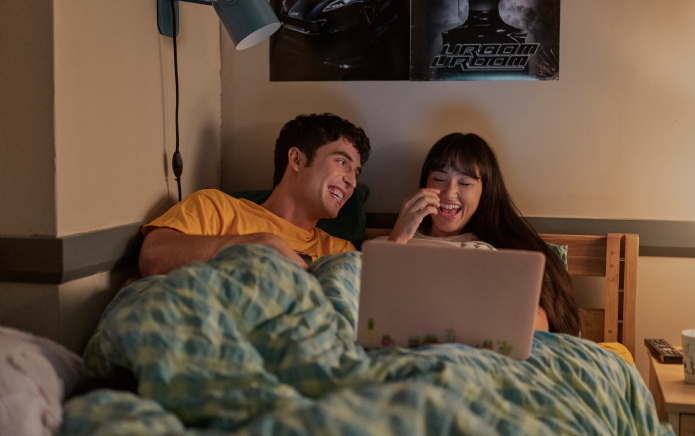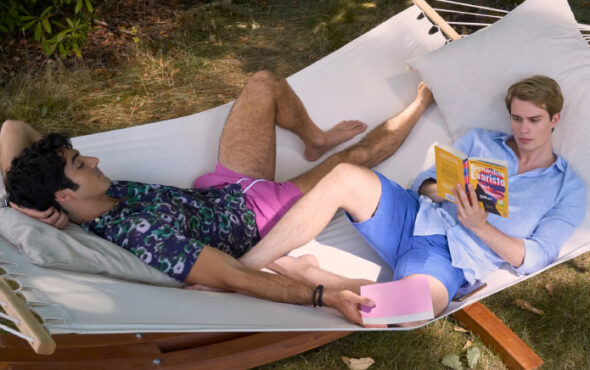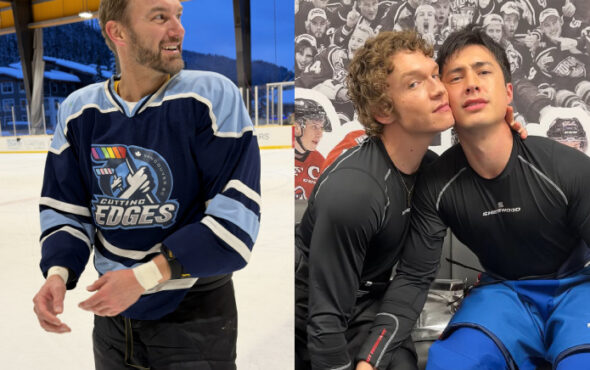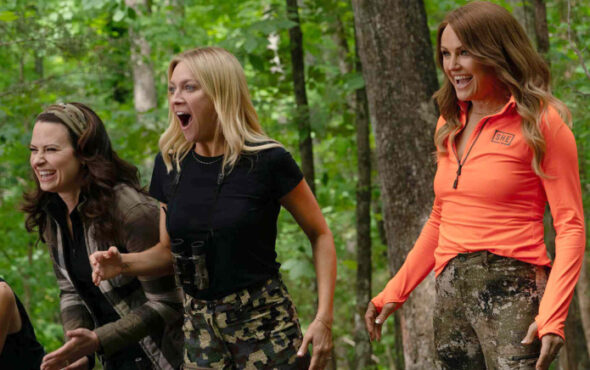
Overcompensating is a raucous show that has had me in stitches and deep in my feelings from the get-go, from its relatable moments to its bi representation (yay!). However, the undertones of those laugh-out-loud moments have an unmistakably sobering effect for someone like me.
Being a teenager in the era of the low-rise jeans, the Motorola flip phone and, who could forget, the blow-up, see-through backpack, (Google it), meant growing up with an ingrained sense of hypervigilance.
Despite Section 28 being repealed in 2003, when I was about 12 years old, the vacuum left by a lack of education on expansive sexualities was quickly filled by an overt homophobia and inherent, inescapable sexualisation of queer women. Especially in the rural areas of North Wales, where I grew up.
In short, by the time I was 13 and curious about other people, (and despite my parents liberal household and acceptance of LGBTQIA+ folks) it had been drilled into me, culturally, that it was not okay to be gay, even if I felt that other queer people were allowed to be who they were.
What persisted during those years filled with growing pains and clumsy encounters was an ever-present fear of being found out. I would watch as my girlfriends would bravely come out as bi or gay, and see them become the subject of sexualisation immediately. The hurt, the confusion, the shame, it was so much to bear that I kept my sexuality hidden from sight for 27 long years.
And so, every time Benny freaked out, that familiar feeling rose in my chest, acidic and threatening. One of sweaty solidarity, yes, but also one of pain. The feeling of everyone knowing your dirty little secret and thinking less of you for it is unshakeable and penetrating.
Have the times changed for Gen-Z?
The short answer is yes, but the long answer is more truthful, so buckle up.
It’s hard to put Paris Hilton’s ‘Stars Are Blind‘ and ‘era of homophobia’ in the same sentence, but the Y2Ks were certainly that. While it nowhere near matched the levels of overt homophobia of the 90s or the violent outbursts of the 80s, culturally, it was still not okay to be gay, as our media often reminded us.
Television shows like Friends, particularly the episode ‘The One With The Male Nanny’, reminded us all that characters Joe Tribiani and Ross Geller’s attitude towards the gay nanny was not a shameful show of bigotry, but instead, seen as a totally normal and understandable reaction, punctuated by laugh tracks and puffed up machismo (yawn).
Even in the sleepy, cosy girl town of Stars Hollow millennials love to visit in ‘spooky season’, we cannot escape the naming of things, like a pink dog carrier, as gay and therefore bad.
When we weren’t laughing with insecure straight men on the telly, or desperately trying to avoid our actions, clothes and pencil cases being labelled as gay, we were getting representations that fell short of depicting the breadth of queer experiences.
Even as the years went on, in 2017, which feels like only a year ago somehow, Human Rights Watch reported a sharp uptick in hate crime, juxtaposed against the National Portrait Gallery’s Queer Art exhibit.
Now, media representation is markedly better. With shows like Overcompensating and I Kissed A Boy, what we are witnessing are gay characters and people in their entirety. Authentically. So progress, yes. But like the Queer Art Exhibit of 2017, this is marred by the backdrop of the rise of the far right and punitive transphobia; and the Pride parades-cum-protests up and down the country banning politicians from rainbow washing their politics, so are things actually getting any better?
Are Gen-Zers better off than we were? Are they still wondering, what if I lose my friends? Will my family accept me? Do I accept myself? These questions, and more, swirled around my mind as a teen and tween, heck, even in my early twenties. Has that panic and anxiety abated for Gen Z? Or are people still as freaked out as ever to have their identity shared before they’re ready to do so?
Is coming out getting easier?
Coming out is never guaranteed to be a safe experience. And, depending on your family situation and broader support networks, estrangement, or worse, is still a very real outcome for many queer and trans kids across the globe.
The media has been pivotal in raising the profile of LGBT rights, particularly the news. But as TV begins to write more complex queer characters, is it helping Gen-Zers know themselves a little better?
“I believe [that] through more gay media and representation, we are helping those who are in the closet to feel less alone.” Luke Francis, 22, tells me over TikTok Messenger.
Francis felt represented, and saw many similarities between his and Benny’s journey on Overcompensating, relating it to personal experiences, he says. “Throughout school, I often met someone and got super close just for them to turn out straight. It makes you feel incredibly lonely.”
While Francis was able to find some sense of self while away at university, going back home to his old town felt bittersweet and left him full of worry. “Going home always put me on edge because I was openly out there [at uni], so seeing Benny put on an act felt very similar to my experience.”
But for Francis, coming out isn’t getting easier. “Sometimes, coming out isn’t scary just because you’re worried about what others think. For myself, I had this internal issue that if I came out, I would admit what I’ve always feared to be true.”
Reflecting on this, he explains that these feelings are entrenched in other people’s feelings, telling him that being gay is wrong. “I think there are a lot out there who feel the same,” he says. “I don’t think it’ll ever be easy until homophobia is no more.”
For Kayleigh Unitt, 25, who grew up around diverse people and with representation within her peer group and family, coming out was an easy experience. They tell Gay Times, “I think, for Gen Z, it’s easier for us to come out to our peers, you know? It’s less of an event.”
“I think that there are more new spaces where we can just exist easily,” says Unitt. However, they are under no illusions that things are this good for everyone. Unitt expresses worry at the rise of the far right and burgeoning tensions online.
While LGBTQIA+ rights are being stripped back in the UK, things aren’t looking any better under the Trump administration in the US.
Katie Szykman, 23, from southern Virginia, explains to me that watching Overcompensating was like reliving her own experiences.
“I graduated high school in 2019, at that time there was only one person who was out in our entire class,” she explains, telling Gay Times that until she went to school in Philadelphia, she was “deeply in the closet.”
Szykman is reminded of these early months at college, watching Overcompensating‘s Benny struggle to fit in. “Even though he knew he was gay, he was still chasing what he thought he should want,” she pauses, “That internal conflict of knowing who you are but still yearning for belonging and validation in ways that don’t align with your truth really struck me. It felt very real.”
It’s clear that for these three Gen-Zers, there is a tender appreciation for how much better things are for them compared to how things were before. But the acceptability of LGBTQIA+ life in the mainstream has been hard-won and recent. Making its tenure a brittle reminder of how quickly things can change for the worse.
“I can only hope that the next generation of LGBTQIA+ kids feels truly welcomed to be themselves without the pressure to fit into some mould of who they should be or what their lives should look like.” Szykman continues. “That they never feel the need to overcompensate or hide parts of who they are just to be accepted.
There should be space to simply exist with pride, with joy, and without fear or shame.”


